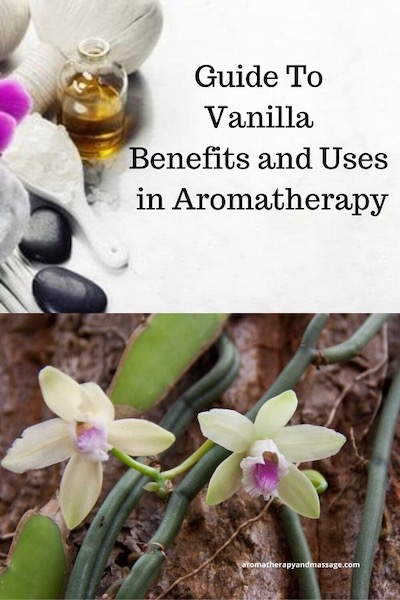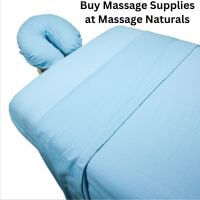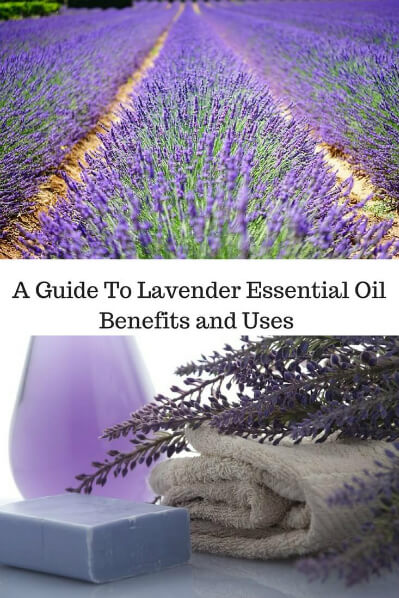- Home
- Essential Oil Profiles
- Vanilla Essential Oil
As an affiliate with Bookshop, Amazon, and other programs, I may earn revenue from qualifying purchases through affiliate links. This does not affect the price you pay. Privacy Policy / Disclosures. This site is for educational purposes only.
Search this site:
Vanilla Essential Oil Is a Myth: How to Use Vanilla in Aromatherapy
Vanilla essential oil does not exist. However, vanilla for use in aromatherapy is available as an oleoresin, absolute, or CO2 extract. To confuse matters, some companies use the words "vanilla essential oil" when selling those products. Be wary when shopping and know what you're buying.
This article will help you understand the differences between the three types of vanilla and how you can use them in aromatherapy.

Basic Vanilla Facts
Plant family: Orchidaceae. Vanilla planifolia is an orchid with edible fruit—pods also called vanilla beans.
Production: The three types of vanilla go through different production processes. See the next section for details.
Aroma: Sweet, rich, warm.
Perfume/Aromatic note: Base
Is vanilla safe to use during pregnancy? Likely safe in small amounts, but consult a professional.
Is vanilla oil safe for children? Generally considered safe.
Cautions: None known.
Main
components depend on how the vanilla is made. However, vanillin tops the list. Source: Essential Oil Safety, 2nd
Edition
Vanilla Oil Production
Note: Exact production processes can vary. This section gives you a general overview of how vanilla is made. I suggest only buying from retailers who explain the production process for the vanilla oil they sell.
Making vanilla extract used in baking involves soaking the chopped vanilla beans in ethyl alcohol (a solvent) and water in large steel containers.
Removing the solvent from the extract creates vanilla oleoresin, a viscous, sometimes semi-solid substance. Oleoresin dissolves best in water- and alcohol-based solutions. Unlike essential oils, oleoresin does not dissolve well in carrier oils.
To produce vanilla absolute, vanilla pods are cured (dried and fermented) for up to six months. Then a solvent is used with the pods to produce a resinoid. Extraction of the resinoid produces vanilla absolute. The process is complex and labor intensive, which means the cost of the absolute is high. The absolute is a dark brown viscous product and has the strongest scent of the three vanillas. Absolute dissolves better in carrier oil than oleoresin but still does not dissolve completely — different products may dissolve less or more.
If you want a product that dissolves well in carrier oil, choose a CO2 extract, which is closer to an essential oil than the other types of vanilla. The vanilla pods are put inside a stainless steel chamber that's injected with carbon dioxide (CO2) gas. The CO2 works as a solvent. The air inside the chamber is pressurized until the CO2 becomes liquid. This supercritical fluid pulls oil from the pods. Then, the liquid turns back into gas and does not leave behind any solvent residue in the vanilla oil. The CO2 extract is a creamy pale yellow to tan color.
Sources
- https://sedonaaromatics.com/the-difference-between-vanilla-absolute-and-vanilla-co2-essential-oil/
- https://www.aromaweb.com/essential-oils/vanilla-oil.asp
- https://vanillaqueen.com/vanilla-extract-an-insiders-view/
- https://vanillaqueen.com/vanilla-oleoresin-and-absolute/
Vanilla Aromatherapy Benefits
Aromatherapy: A Complete Guide to the Healing Art: The scent of vanilla is consoling and soothing. It improves your confidence and helps get rid of pent-up anger and frustration. The oil is also an aphrodisiac. It stimulates the brain and may keep some people awake.
The Complete Book of Essential Oils and Aromatherapy: Use vanilla to relieve restlessness, insomnia, inability to relax, nervous stomach, nausea, nervous anxiety, nervousness, and stress-induced conditions.
375 Essential Oils and Hydrosols: Vanilla has powerful uses as an aphrodisiac, in perfume blends, and to flavor and fragrance anything.
The Aromatherapy Encyclopedia: Vanilla is calming, reduces stress, promotes restful sleep, encourages dreaming, uplifts mood, and works as an aphrodisiac. The oil is also a fixative often used in perfumes and other fragrances.
Nature in Bottle: Using vanilla essential oil on skin may help prevent and reverse free-radical skin damage. Other possible vanilla essential oil skin benefits are to help treat acne, slow down formation of age spots, fine lines, and wrinkles, and restore the brightness and softness of skin.
- The rasa (taste) of vanilla is bitter and sweet, the vipaka (aftertaste) is sweet, and the virya (energy) is warm and moisturizing.
- The oil decreases vata and pitta and increases kapha.
- Tissue most affected by the oil is nerve.
- Indications for this essential oil include anger, frustration, irritability, and late periods. The oil is a relaxant and aphrodisiac and supports happiness and joy.
Elizabeth Van Buren: Vanilla opens the throat (fifth) chakra and also increases spiritual and physical energy, intuition, vitality, and love.
Vanilla-Infused Carrier Oil
Because oleoresin does not dissolve in in carrier oils, you might want to make vanilla-infused jojoba oil to use in your aromatherapy blends. Here's how:
- Add about 1/2 ounce (1 tablespoon) of vanilla oleoresin to a 4–8 ounces (1/2 to 1 cup) jojoba in a glass bottle.
- Close the bottle and let it sit for about two weeks. The oleoresin will stay at the bottom of the bottle and will infuse aroma into the oil.
Use the vanilla-infused oil as a carrier oil in aromatherapy recipes.
Vanilla Essential Oil Uses and Blends
You can use any type of vanilla oil for the following essential oil blends with vanilla. However, for diffusing, avoid the thicker oils (such as a semi-solid oleoresin) that might clog a diffuser.
Meditation Diffuser Blend
- 2 drops vanilla
- 2 drops atlas cedarwood essential oil
- 2 drops rose
Source: Eden's Garden
Relaxing Diffuser Blend
- 2 drops of vanilla
- 2 drops of sweet orange essential oil
- 1 drop of neroli essential oil
Use this blend in a diffuser or personal aromatherapy inhaler.
Source: Plant Therapy
Sugar Scrub
- 8 drops vanilla oil
- 8 drops neroli essential oil
- 8 drops sandalwood essential oil
- 8 drops sweet orange essential oil
- 1/2 cup carrier oil
- 1/2 cup cane sugar
Combine
ingredients and stir well. Use a circular motion to apply some of the
scrub to your skin. Wash off with warm water. Store remaining scrub in
an airtight container for up to six months.
Source: 150 Ways to Use Essential Oils from Eden's Garden
Vanilla Sugar Body Scrub
Rub gently with this invigorating scrub. Do not use on your face.
- 1/2 cup sugar (maple, granulated, or use turbinado for a more grainy scrub)
- 1/2 cup fine sea salt
- 1/4 cup carrier oil
- 1 tablespoon honey
- 1 tablespoon kaolin or china clay (white)
- 10 drops vanilla oil
- 10 drops lemon essential oil
- 10 drops orange essential oil
Combine all ingredients in a small bowl. Spoon into jar. Makes 2 cups. The oil rises to the top. Stir the scrub before using.
Source: Jeanne Rose. She believed the CO2 extract is preferable for skin care.
Sweet Vanilla Bubble Bath
- 6 drops vanilla oil
- 1-1/2 cups liquid castile soap
- 2 tablespoons vegetable glycerin
- 1/2 tablespoon white sugar
- 5 drops food coloring of choice (optional)
- Gently stir together all ingredients in a large glass bowl.
- Pour the bubble bath to a clean dark glass jar. Let set for at least 24 hours before using. Store in a cool, dark place.
- To use: Add 1/4 cup to a warm bath and stir to disperse. Soak for 10 to 20 minutes.
Source: The Big Book Of Essential Oil Recipes For Beauty
Photo Credit: 123rf.com



